 Historically I scoured libraries and internet sites for tips and tricks to further my disordered eating behaviours. Over the years, pro-ana and mia sites, which readily offered these dangerous and detrimental tips and tricks, increased in existence and ease of accessibility. Practical ideas to support recovery however didn’t seem to be as easily accessible or prolific. When it comes to recovery, there seems to be an abundance of advice on the ‘what’s’ (e.g. need to eat, need to work on perfectionism, need to improve self-esteem, need to challenge disordered thinking, need to let go of seeing everything in black and white extremes, etc) but finding the answers on the ‘how to’s’ seems to be a rarity. I have found that in recovery, it is relatively easy to look back and describe from where you’ve come and in contrast, what life is like where you are now at, but it can be challenging to identify what helped you cross that distance, what little things supported those changes, what practical things others can do to likewise journey to recovery. So, as I am walking this path of recovery, I am actively recording those things which help me in my journey in the hopes that my communications with you won’t be marked by vague sentiments, and that the little, practical things that supported me will not be lost, but may one day help or support you also.
Historically I scoured libraries and internet sites for tips and tricks to further my disordered eating behaviours. Over the years, pro-ana and mia sites, which readily offered these dangerous and detrimental tips and tricks, increased in existence and ease of accessibility. Practical ideas to support recovery however didn’t seem to be as easily accessible or prolific. When it comes to recovery, there seems to be an abundance of advice on the ‘what’s’ (e.g. need to eat, need to work on perfectionism, need to improve self-esteem, need to challenge disordered thinking, need to let go of seeing everything in black and white extremes, etc) but finding the answers on the ‘how to’s’ seems to be a rarity. I have found that in recovery, it is relatively easy to look back and describe from where you’ve come and in contrast, what life is like where you are now at, but it can be challenging to identify what helped you cross that distance, what little things supported those changes, what practical things others can do to likewise journey to recovery. So, as I am walking this path of recovery, I am actively recording those things which help me in my journey in the hopes that my communications with you won’t be marked by vague sentiments, and that the little, practical things that supported me will not be lost, but may one day help or support you also.
Here is a list of some of those things which have supported me:
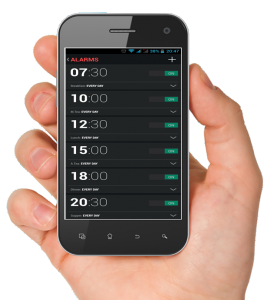 Alarms to remind me to eat – I have created 6 recurring alarms on my phone to go off each day at my allotted meal times (7.30am, 10am, 12.30pm, 3pm, 6pm, and 8.30pm). I no longer have any excuse for ‘forgetting’ to eat. Without the alarms, it is easy for one of my meal times to slide into the next without consuming anything, and although it might not be an active decision to allow the eating disorder to take some ground, it does so passively. Even ground taken passively by the eating disorder, is ground that healthy Sarah is relinquishing. By setting these alarms, I take back control of my life as when the alarm sounds, it requires a more active decision to eat or not to eat…and when I stop and think about my goals and where I want to be, I usually choose to behave in accordance with my values, adhere to my meal plan and eat.
Alarms to remind me to eat – I have created 6 recurring alarms on my phone to go off each day at my allotted meal times (7.30am, 10am, 12.30pm, 3pm, 6pm, and 8.30pm). I no longer have any excuse for ‘forgetting’ to eat. Without the alarms, it is easy for one of my meal times to slide into the next without consuming anything, and although it might not be an active decision to allow the eating disorder to take some ground, it does so passively. Even ground taken passively by the eating disorder, is ground that healthy Sarah is relinquishing. By setting these alarms, I take back control of my life as when the alarm sounds, it requires a more active decision to eat or not to eat…and when I stop and think about my goals and where I want to be, I usually choose to behave in accordance with my values, adhere to my meal plan and eat.- Mechanical eating – When my alarm goes off, I eat – whether I feel like it or not, whether I’m hungry or not, no matter how nauseous I feel, I eat what I have pre-planned according to my meal plan and menu…I take the decision making out of it, count to 3, take a deep breath, and just do it. I don’t always like it and initially, this can be really tough, but the more time and space I give to thinking about it, the harder it becomes. I remove the decision making by just doing it.
- Back up snack – Many times, I’ve been caught out by unexpected delays or changes to plans which has
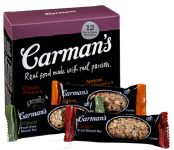 resulted in skipping one or more meals. This is a major danger zone for me as several missed meals in a row has a profound impact on my mental health and often results in a rapid, steep slide, despite my best intentions. Once the slide starts to take place, it is incredibly difficult for me to claw my way back to where I was only a few short hours ago…not impossible, but challenging and unpleasant. Why put myself through that unnecessarily? I have learnt that it is important for me to carry a couple of snacks (e.g. dried fruit, muesli bar, crackers, pepitas, etc) around in my bag with me in the event of limited access to food. This is often enough to pull me through that period until I am once again able to consume my normal meal.
resulted in skipping one or more meals. This is a major danger zone for me as several missed meals in a row has a profound impact on my mental health and often results in a rapid, steep slide, despite my best intentions. Once the slide starts to take place, it is incredibly difficult for me to claw my way back to where I was only a few short hours ago…not impossible, but challenging and unpleasant. Why put myself through that unnecessarily? I have learnt that it is important for me to carry a couple of snacks (e.g. dried fruit, muesli bar, crackers, pepitas, etc) around in my bag with me in the event of limited access to food. This is often enough to pull me through that period until I am once again able to consume my normal meal. - Menu planning – Based on the meal plan my dietitian and I have agreed upon and my body’s needs for the various macro and micro nutrients at each meal, I sit down and plan my week’s menu in advance. This helps to eliminate decision making at each meal time. I have found that it is better to spend 20 minutes planning several days’ meals than 1 hour speculating over one meal. This also allows me to decide what I will eat away from the anxiety of meal times and ensures I buy the correct quantity of food in advance so there’s not too little or too much food in the fridge. I will talk more about menu planning in the section on ‘Eating’.
 Recovery Record – Recovery Record is an app that I initially used to manage my recovery through self-monitoring my intake, mood and thoughts; tracking my progress over time; earning rewards through logging my meals; being part of a supportive community; and automatically sharing data with my treatment team.
Recovery Record – Recovery Record is an app that I initially used to manage my recovery through self-monitoring my intake, mood and thoughts; tracking my progress over time; earning rewards through logging my meals; being part of a supportive community; and automatically sharing data with my treatment team.- Getting rid of the scales – What is weight? Weight is just a measure of how strongly gravity pulls downwards. It’s just a number. And it doesn’t define me. I am more than a number.
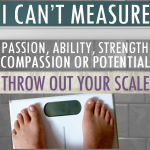 My day/week/life needn’t be ruled by whether a number increases, decreases or stays the same. It’s more important to be healthy. It’s easy for me to become consumed by numbers and to want to fixate on them, as they are something practical, tangible, measurable, in a world that often feels topsy-turvy and unstable. Numbers are more predictable…but in order to see them continually decrease, I would need to engage increasingly in disordered behaviours. Nothing good comes from me weighing myself – I am never satisfied. If my weight needs to be monitored, it is done so by my GP, dietitian or treating team, and I choose not to see it. Perhaps one day I will be able to see my weight without me attributing more to it than it signifies, but really, I don’t see any reason why I’d ever need to know my weight.
My day/week/life needn’t be ruled by whether a number increases, decreases or stays the same. It’s more important to be healthy. It’s easy for me to become consumed by numbers and to want to fixate on them, as they are something practical, tangible, measurable, in a world that often feels topsy-turvy and unstable. Numbers are more predictable…but in order to see them continually decrease, I would need to engage increasingly in disordered behaviours. Nothing good comes from me weighing myself – I am never satisfied. If my weight needs to be monitored, it is done so by my GP, dietitian or treating team, and I choose not to see it. Perhaps one day I will be able to see my weight without me attributing more to it than it signifies, but really, I don’t see any reason why I’d ever need to know my weight. - Letting go of counting calories – A calorie does NOT equal fat and weight gain. A calorie is actually a measure of energy – it is the amount of energy or heat it takes to raise the temperature of 1 gram of water by 1 degree Celsius. Furthermore, foods cannot be reduced to a single numeric value and that number be reflective of its benefits. Nutrition has very little to do with calories, if anything at all. Contrary to popular belief, my body does not tally up at the end of each day how many calories I have consumed and expended then alter its weight accordingly. My body is far more complex than that! There are soooo many variables and my body uses different kinds of food/energy in different ways for different processes. Psalm 139:13-14 says: “You made all the delicate, inner parts of my body and knit me together in my mother’s womb.
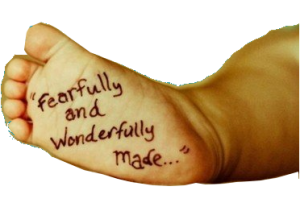 Thank you for making me so wonderfully complex! Your workmanship is marvellous—how well I know it”. So, I have thrown out the concept of calorie calculation; I’m trusting my dietitian and doctor to shape my meal plan around what my body needs to repair and function at its maximum capacity; and I’m trusting my body to use that energy it receives in the way it most needs it and the way God creatively designed it. My body is a mass of systems and processes and cannot be reduced to an overly simplistic single calculation.
Thank you for making me so wonderfully complex! Your workmanship is marvellous—how well I know it”. So, I have thrown out the concept of calorie calculation; I’m trusting my dietitian and doctor to shape my meal plan around what my body needs to repair and function at its maximum capacity; and I’m trusting my body to use that energy it receives in the way it most needs it and the way God creatively designed it. My body is a mass of systems and processes and cannot be reduced to an overly simplistic single calculation. - Netball – Once I was cleared to resume a measure of physical activity, I joined a netball team. Participating in this sport involved a couple of hours training and fitness per week and then games on weekends.
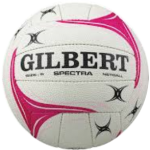 When I exercise alone, I am vulnerable to my disordered thoughts running rampant and my mind easily fixates on that which is not helpful. I also find it more difficult to monitor the duration, frequency, and intensity of my exercise. When I engage in team sports, I find my mind focusing more on the game, teamwork, the social elements, and healthy competition. Before I know it, I have completed a healthy dose of exercise and have kept my eating disordered thoughts in check. My coach and team are aware of my struggles and help to monitor my participation if necessary. Not only has this been a ‘safe’ way for me to engage in physical activity, but it has broadened and strengthened my social support networks and allowed me to develop friendships with people outside the world of eating disorders.
When I exercise alone, I am vulnerable to my disordered thoughts running rampant and my mind easily fixates on that which is not helpful. I also find it more difficult to monitor the duration, frequency, and intensity of my exercise. When I engage in team sports, I find my mind focusing more on the game, teamwork, the social elements, and healthy competition. Before I know it, I have completed a healthy dose of exercise and have kept my eating disordered thoughts in check. My coach and team are aware of my struggles and help to monitor my participation if necessary. Not only has this been a ‘safe’ way for me to engage in physical activity, but it has broadened and strengthened my social support networks and allowed me to develop friendships with people outside the world of eating disorders. - Mentoring – Through Isis’ Peer Mentor Program, I was matched with someone who had sustained a period of recovery from an eating disorder herself. This was the first time I had really met anyone who had faced an eating disorder and had emerged the other side, healthier, stronger, and with a zeal for life. In challenging times, I have reached out to my mentor and she has provided encouragement, understanding and practical support.
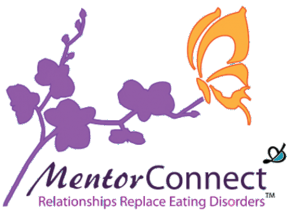 She has been a sounding board, and a resource from which I have gained invaluable insight and understanding. She has shared her journey with me – the challenges, changes, and possibilities. And she has celebrated my successes and joys with me. Engaging with my mentor imparted hope and inspiration that recovery is possible; gave opportunity to ask questions and receive first-hand input on authentic strategies for healing and recovery; provided me with peer support to navigate the tough journey of recovery in the community; allowed me to connect with someone who genuinely understands the effects of the eating disorder upon my life; reduced social isolation; and assisted with practical weekly meal support in the community to diminish the necessity, frequency and duration of inpatient treatment. To learn more about the Isis Peer Mentor Project, contact Alee or Amanda at Isis on (07) 38446055; see www.isis.org.au; or email [email protected]. There is also a global internet-based community – MentorCONNECT – see www.mentorconnect-ed.org for more information).
She has been a sounding board, and a resource from which I have gained invaluable insight and understanding. She has shared her journey with me – the challenges, changes, and possibilities. And she has celebrated my successes and joys with me. Engaging with my mentor imparted hope and inspiration that recovery is possible; gave opportunity to ask questions and receive first-hand input on authentic strategies for healing and recovery; provided me with peer support to navigate the tough journey of recovery in the community; allowed me to connect with someone who genuinely understands the effects of the eating disorder upon my life; reduced social isolation; and assisted with practical weekly meal support in the community to diminish the necessity, frequency and duration of inpatient treatment. To learn more about the Isis Peer Mentor Project, contact Alee or Amanda at Isis on (07) 38446055; see www.isis.org.au; or email [email protected]. There is also a global internet-based community – MentorCONNECT – see www.mentorconnect-ed.org for more information).
- A good treating team – It is incredibly difficult to conquer an eating disorder alone. I have seen numerous doctors, psychologists, counsellors, dietitians etc. Some have been beneficial, whilst others have actually compounded the problem and fuelled the eating disorder. If you encounter professionals that have limited understanding or are unable to provide the support you need, don’t give up. Keep searching. There are some brilliant clinicians around. I now have an amazing case manager, psychologist, psychiatrist, GP, counsellor, and dietitian – and they all communicate and work together as a team to support my recovery. See the Get Help section for links to some brilliant supports.
- Trusting my team instead of ED – It is extremely difficult to accept that what I see and how I perceive things may actually be distorted. Trusting my treating team, knowing that they have my health and best interests at heart, has been really beneficial. I have learnt that I cannot trust the eating disorder and sometimes I just need to follow my team’s advice, even if everything within me screams against it.
- Spending time with my nieces, nephew and cousins – Spending time with children is priceless. They love and accept
 me just the way I am. They bring humour and joy to my life. They remind me of the beauty, innocence, and goodness in life. They remind me of why I want to get better – it is such a privilege to be involved in their lives, and that is severed when I spend all my time in hospital or consumed by the eating disorder. I want to set an example for them and see them grow into confident young men and women.
me just the way I am. They bring humour and joy to my life. They remind me of the beauty, innocence, and goodness in life. They remind me of why I want to get better – it is such a privilege to be involved in their lives, and that is severed when I spend all my time in hospital or consumed by the eating disorder. I want to set an example for them and see them grow into confident young men and women.
- Journaling – Journaling has played a significant role in my life and recovery journey.
 From a young age, I began to process and record events, thoughts, feelings, challenges and joys through ‘stream-of-consciousness’ writing (recording my thoughts and feelings in a continuous and uninterrupted flow); poetry; song-writing; and visual arts (from scribbles to more elaborate artworks). When overwhelmed with emotion or a continuous stream of intrusive thoughts, projecting them onto paper has helped to clarify my feelings and thoughts; slow these processes down; cope more effectively with them; gain greater insight into myself; and allowed me to problem solve more effectively. My journal travels everywhere with me and I take every opportunity I can (in doctor’s waiting rooms, on the bus, after lunch, etc) to reflect and record. For more information on journaling, its benefits and how to go about it, see here.
From a young age, I began to process and record events, thoughts, feelings, challenges and joys through ‘stream-of-consciousness’ writing (recording my thoughts and feelings in a continuous and uninterrupted flow); poetry; song-writing; and visual arts (from scribbles to more elaborate artworks). When overwhelmed with emotion or a continuous stream of intrusive thoughts, projecting them onto paper has helped to clarify my feelings and thoughts; slow these processes down; cope more effectively with them; gain greater insight into myself; and allowed me to problem solve more effectively. My journal travels everywhere with me and I take every opportunity I can (in doctor’s waiting rooms, on the bus, after lunch, etc) to reflect and record. For more information on journaling, its benefits and how to go about it, see here. - My husband – I am incredibly blessed to have a man who has loved me unconditionally, stood by me and supported me through some extremely dark times. Thinking about my future with him and being a wife and mother, has propelled me toward recovery. Life with him is severely hampered if I spend all my time in hospital or consumed by the eating disorder. I am assured of his love for me, even when I am unable to demonstrate it in return. This has brought great hope and healing to my life.
- Identifying the ED thoughts and addressing them – Recognising what is the ‘ED voice’ and the ‘Healthy Sarah’ voice has been pivotal. Initially, I believed all my thoughts to be true and the ED thoughts had become so enmeshed with my own that I could not separate the two. Now when I am having thoughts, I am increasingly able to ‘label’ them and recognise that ‘oh – that’s one of the old familiar ED thoughts…what would my reasonable, wise mind, or healthy Sarah say?’. For more on dealing with eating disorder and intrusive thoughts, see Coping Strategies.
- Engagement in creative projects – Taking an art class, doing some origami, making cards or gifts for others, knitting scarves/beanies/blankets for children in Russia (or doggy jumpers for my pooch), doing a jigsaw puzzle, learning to play an instrument, playing with play-dough, or
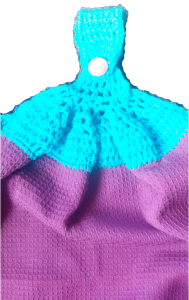 working with my hands and producing something, are all activities that have provided me with an outlet for creative expression, kept my mind and body occupied when I was too unwell to work or study, and allowed me to be productive in my darkest moments. This has contributed to my self-esteem and self-efficacy, and helped redirect focus from perfectionism and eating disorder cognitions, to something more aesthetically pleasing and soul-soothing. Recently, my best friend’s mum taught me to crochet and I am now able to add that to my list of enjoyable activities and competencies. 😀
working with my hands and producing something, are all activities that have provided me with an outlet for creative expression, kept my mind and body occupied when I was too unwell to work or study, and allowed me to be productive in my darkest moments. This has contributed to my self-esteem and self-efficacy, and helped redirect focus from perfectionism and eating disorder cognitions, to something more aesthetically pleasing and soul-soothing. Recently, my best friend’s mum taught me to crochet and I am now able to add that to my list of enjoyable activities and competencies. 😀  My dog – Although my parents now have my dog full-time as I was unable to care for her due to my frequent and extensive hospital admissions, when I visit, rolling around on the floor, cuddles and play, has been incredibly therapeutic. Pets can be a great support and the simple act of caring for something that is totally dependent on you can be incredibly beneficial.
My dog – Although my parents now have my dog full-time as I was unable to care for her due to my frequent and extensive hospital admissions, when I visit, rolling around on the floor, cuddles and play, has been incredibly therapeutic. Pets can be a great support and the simple act of caring for something that is totally dependent on you can be incredibly beneficial.- Something bigger than myself – Contributing to meaningful projects and believing in the cause of something bigger than and outside of myself has helped keep a focus on recovery. Advocacy, volunteering, writing support letters for organisations, providing feedback, creating this resource to help others etc helps to keep me on track as it is important to me to maintain authenticity and credibility.
- Renewing my mind – Over the years, I have fixated on innumerable negative beliefs, quotes, and images that eventually became entrenched in my mind, creating solid neural pathways like well-worn tracks in the bush, impacting my emotions and behaviours, and thereby fuelling my eating disorder. In the Bible, in Romans 12:2, it says: “Do not conform to the pattern of this world, but be transformed by the renewing of your mind”. How do I renew my mind though? How do I establish new synapses and neural pathways in my brain?
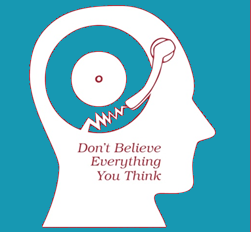 Well, it’s similar to carving out a new pathway in the bush – it requires taking a new route over and over until it is well-worn. The more I take this new path, the easier it is to take and the more visible it becomes. If I refrain from taking the old path, it eventually grows over. One of the ways I have endeavoured to do this, is through the creation of the Inspo Box…basically I compiled a collection of images, quotes and favourite Bible verses that have sustained me during the tough times and motivated me to continue moving forwards toward recovery. When the old thoughts and images come to mind, I meditate on the new thoughts and images that I would like to replace them with. The new pathways become stronger the more they are used. Philippians 4:8 says: “I’d say you’ll do best by filling your minds and meditating on things true, noble, reputable, authentic, compelling, gracious—the best, not the worst; the beautiful, not the ugly; things to praise, not things to curse”. As I continue to do this, my mind is gradually transformed and renewed.
Well, it’s similar to carving out a new pathway in the bush – it requires taking a new route over and over until it is well-worn. The more I take this new path, the easier it is to take and the more visible it becomes. If I refrain from taking the old path, it eventually grows over. One of the ways I have endeavoured to do this, is through the creation of the Inspo Box…basically I compiled a collection of images, quotes and favourite Bible verses that have sustained me during the tough times and motivated me to continue moving forwards toward recovery. When the old thoughts and images come to mind, I meditate on the new thoughts and images that I would like to replace them with. The new pathways become stronger the more they are used. Philippians 4:8 says: “I’d say you’ll do best by filling your minds and meditating on things true, noble, reputable, authentic, compelling, gracious—the best, not the worst; the beautiful, not the ugly; things to praise, not things to curse”. As I continue to do this, my mind is gradually transformed and renewed. - God – Simply put, knowing that God is always with me, for me, loving and accepting me unconditionally, and fighting for me, gives me hope, brings peace to my soul, and strengthens me. Even when I turn my back on him, he never seems to give up on me. He believes in me and holds hope for me, even when all seems so despairing and hopeless. Being able to talk to him at anytime, anywhere, about anything, means I’m never truly alone. His help is only ever a prayer away…with him, I can get through this.
- Relationships are key – Eating disorders are incredibly isolating. When completely consumed by the eating disorder, I have often found that my sole sense of belonging and community is derived from those that are also acutely unwell. Whilst affording a measure of understanding, these relationships haven’t always been particularly beneficial in supporting my recovery. I have found that maintaining contact with family, friends, support people, and the outside world has helped to remind me that I am not alone and that I am loved and cared for; helped me to recall the reasons for why I want to recover; and provided an essential additional level of support.
- Nutritional Education – I have formed and bought into innumerable false beliefs regarding food and nutrition.
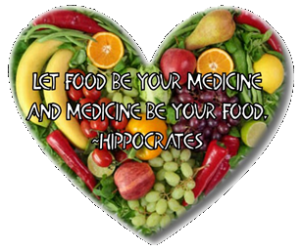 Many of these erroneous beliefs and lies fed to me by my eating disorder have been promoted by a multi-billion dollar diet industry that sells false hope to the detriment of its consumers’ health. I equated knowledge of calories and grams of sugar, protein, fats etc with knowledge of nutrition…they are NOT synonymous. In the early stages of recovery, there seems to be a lot of emphasis on needing to eat and WHAT to eat, but not necessarily a lot of information on WHY we need to eat, HOW the body works, the interactions of macro/micro nutrients on bodily processes, etc. For example, I had no idea that lipids/fats were actually one of the 3 macronutrients, and that many vitamins for example, are only soluble in fats. Access and exposure to evidence-based healthy messages and recovery-facilitating material; developing critical thinking and media literacy; cultivating a healthy understanding of the nutrients the body requires and their physiological significance; and accurate nutritional information and knowledge is helping to dispel a lot of my food fears and irrational eating disorder rules. I am currently working on a project entitled ‘No Numbers Nutrition‘ with a team of dietitians and other health professionals. It will provide trigger free, accurate nutritional information to those recovering from disordered eating. I will let you know once this resource and website go live…it is super exciting!
Many of these erroneous beliefs and lies fed to me by my eating disorder have been promoted by a multi-billion dollar diet industry that sells false hope to the detriment of its consumers’ health. I equated knowledge of calories and grams of sugar, protein, fats etc with knowledge of nutrition…they are NOT synonymous. In the early stages of recovery, there seems to be a lot of emphasis on needing to eat and WHAT to eat, but not necessarily a lot of information on WHY we need to eat, HOW the body works, the interactions of macro/micro nutrients on bodily processes, etc. For example, I had no idea that lipids/fats were actually one of the 3 macronutrients, and that many vitamins for example, are only soluble in fats. Access and exposure to evidence-based healthy messages and recovery-facilitating material; developing critical thinking and media literacy; cultivating a healthy understanding of the nutrients the body requires and their physiological significance; and accurate nutritional information and knowledge is helping to dispel a lot of my food fears and irrational eating disorder rules. I am currently working on a project entitled ‘No Numbers Nutrition‘ with a team of dietitians and other health professionals. It will provide trigger free, accurate nutritional information to those recovering from disordered eating. I will let you know once this resource and website go live…it is super exciting! - Prayer support – I have been incredibly blessed to have people around the globe join together to pray for me, believe in me, and send words of hope and encouragement. They were fighting right alongside me for victory, freedom, and recovery. When my health declined or I was majorly struggling, when I was on life support or fighting treatment, when I was trying hard but kept on slipping, and when I was arduously making new ground, I knew that family, friends, churches, and complete strangers were praying for me and standing with me. In October 2013, I had the privilege of flying to New Zealand to meet with some of these people and thank them for all their support and the part they have played in my recovery. If you would like some people to pray for you and don’t know of anyone you can contact in this regard, please send me an email and I will set this in motion for you.
- Meal Support – Establishing regularity and adequacy when it came to meal times was extremely difficult for me to do alone. I knew I needed daily meal support to strengthen recovery and reduce the risk of relapse, but such a program was inaccessible. I therefore began instituting my own meal support program,
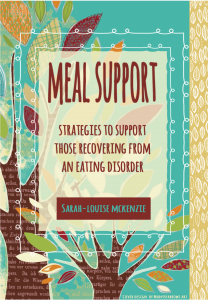 organising to eat at least one meal a day with a support person (my therapist, case manager/psychologist, mentor, partner, parents, friends, or at group therapy). It was challenging and required navigating new waters, but in collaboration, we began to increase my regularity and adequacy of nutrition and take steps towards recovery. Through trial and error, we discovered what did and didn’t work, and I became more skilled in identifying and communicating to my support people what I needed. Through having people support me at meal times, I was able to access role models for learning skills such as an appropriate pace of eating, appropriate meal time behaviours, normal quantities, healthy discussion around the table, etc. I have been actively working through Shane Jeffrey’s RAVES process (Regularity, Adequacy, Variety, Eating Socially, and Spontaneity) and continue to access meal support in challenging ‘food fears’ and introducing new foods, and eating out at restaurants and food courts, etc. I am hoping to be part of establishing a community-based meal support program in the near future, so if you would like to be kept updated about this, find out more information, be placed on the waiting list, or volunteer in providing meal support, please email me. Taking responsibility for your own recovery though is generally far more effective than externally enforced treatment, so I encourage you to create the support you need around meals…ask your GP or therapist if you can eat a snack or a meal with them during your appointment, ask some close family or friends if they will have a meal with you once a week, etc. The Meal Support Book is a great resource to assist you and your support person in your journey.
organising to eat at least one meal a day with a support person (my therapist, case manager/psychologist, mentor, partner, parents, friends, or at group therapy). It was challenging and required navigating new waters, but in collaboration, we began to increase my regularity and adequacy of nutrition and take steps towards recovery. Through trial and error, we discovered what did and didn’t work, and I became more skilled in identifying and communicating to my support people what I needed. Through having people support me at meal times, I was able to access role models for learning skills such as an appropriate pace of eating, appropriate meal time behaviours, normal quantities, healthy discussion around the table, etc. I have been actively working through Shane Jeffrey’s RAVES process (Regularity, Adequacy, Variety, Eating Socially, and Spontaneity) and continue to access meal support in challenging ‘food fears’ and introducing new foods, and eating out at restaurants and food courts, etc. I am hoping to be part of establishing a community-based meal support program in the near future, so if you would like to be kept updated about this, find out more information, be placed on the waiting list, or volunteer in providing meal support, please email me. Taking responsibility for your own recovery though is generally far more effective than externally enforced treatment, so I encourage you to create the support you need around meals…ask your GP or therapist if you can eat a snack or a meal with them during your appointment, ask some close family or friends if they will have a meal with you once a week, etc. The Meal Support Book is a great resource to assist you and your support person in your journey.
I will endeavour to continue to add to this list as I discover other tips and tricks that support my recovery. I encourage you to fill in the form below with your ideas as well, as we can all learn and grow from each other’s experiences. Who knows? That one little practical thing you do to help you stay the course of recovery might just be a key to unlock the door to another’s recovery. Please keep in mind the guidelines for submissions.
[formbuilder:2]
